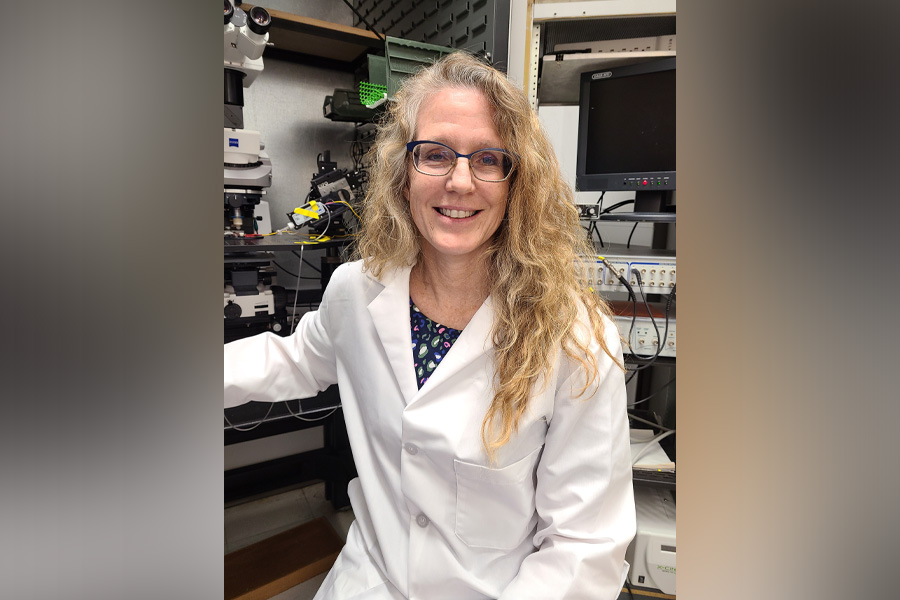Faculty Spotlight: Debra Ann Fadool

Debra Ann Fadool is a Distinguished Research Professor holding appointments in the Department of Biological Science, the Program in Neuroscience and the Institute of Molecular Biophysics; all units of Florida State University’s College of Arts and Sciences. She is also an associate dean in the Graduate School and director of FSU’s Office of Postdoctoral Affairs. Fadool’s research focuses on the physiology of sensory systems, particularly chemosensory systems — olfaction and taste.
Tell me a little about your background and academic credentials.
I grew up in Kentucky but moved to Michigan where I earned an undergraduate degree in biology and English from Albion College. From there, I earned my master’s in zoology and analytical chemistry from the University of Rhode Island. At that time, I was interested in marine biology and oceanography. Upon finishing my master’s, I took classes at Michigan State University while my husband, Jim, finished his doctorate. I then transferred to the University of Florida where I continued using marine models to explore fundamental neurobiology and earned my Ph.D. in zoology through electrophysiological studies at St. Augustine's Whitney Marine Laboratory. I enjoy recordings of electrical signals from the brain — called action potentials — as the basic unit of human thought. At the Whitney Lab, I was recording olfactory signaling in lobsters because their nervous system mimics many of the same components as humans.
What brought you to Florida State University? Why do you enjoy working at FSU?
I came to FSU in 1999 because of the opportunity that the then-new College of Medicine provided. FSU had unique opportunities for dual-career academic couples, and the Program in Neuroscience and Institute of Molecular Biophysics were big draws. I knew there were faculty here with historic expertise in chemical senses and wanted to be part of that team.
Can you break down your areas of research for us?
One of the main questions my research aims to answer is “What does obesity and overnutrition do to the structure and function of the nervous system?” Our experiments analyze the impacts that consuming excess energy, or overnutrition, have on the electrical signals sent through the olfactory system. Overnutrition can cause development of olfactory circuits that disrupt hunger and satiation patterns. These new circuits cause memory loss and other cognitive disfunction that is not remedied once proper levels of nutrition are restored.
Together with the Doug Storace Laboratory we are finding that the olfactory system is connected to the hypothalamus, a deep-brain structure whose main function is to influence the nervous system and manage hormones in order to keep the body in a stable state of equilibrium known as homeostasis. This tells us olfaction has impacts for energy use (energy homeostasis) and body weight regulation (whole-body metabolism).
What makes you passionate about your research?
As a scientist, it’s exciting to have a question, design an experiment, and be the first to see the results. It has been said that ‘Discovery favors the prepared mind.’ One never knows what you may discover, but if you read, train, learn new areas of science, have discourse with your colleagues and your trainees – you will recognize that momentous result when it occurs – and then you can examine it again using a different parallel strategy to test if it is valid! I always look forward to waking up and going into the lab, and I’m also passionate about mentoring my students in the lab. It is a challenging yet fulfilling apprenticeship to be a scientist. Creating opportunities for students and young scientists is one of the primary reasons I wanted to work in academia.
What inspired you to choose your field of study?
When I was interviewing for graduate school, I walked into a lab that was doing brain recordings. They had an electron gun shooting a beam of electrons across a phosphorous screen to measure changes in voltage. With the audio turned up on the amplifier, it was as if the nervous system was talking to you! I find it fascinating how the body is like a machine, and I love figuring out how it works.
What do you want the public to know about your research? Why is your topic important?
Olfaction was really put on the map with the COVID-19 pandemic. The virus infects support cells in the olfactory epithelium of your nose, and 60 percent of infected individuals worldwide lost their sense of smell. Try holding your nose while you chew some savory food – without your olfactory system, you cannot taste. Loss of olfaction really changes an individual’s quality of life. Scientists have discovered that the genetic architecture of the nerve cells in the nose changes following COVID-19 viral infection, and for some, this evokes long-COVID and enduring losses of chemosensory ability and cognition. I would also like the public to know that you are what you eat — be mindful of healthy nutrition because it impacts every organ system in your body, including your brain. Finally, just because a product comes from a plant and is classified as a natural product doesn't mean that we know everything about it, how it works in the body or if it is safe.
What is your favorite part of your job?
Every day is different. Every day, there are new discoveries and challenges that must be solved. I also get to interact with lots of different individuals and put on many hats — I love that diversity. I get to see students gain opportunities along their own career ambitions and that is most satisfying — especially when we reconnect years down the line, and I am witness to how they have impacted their communities.
If your students only learned one thing from you (of course, hopefully they learn much more than that), what would you hope it to be?
To think critically and to evaluate the validity of information sources.
